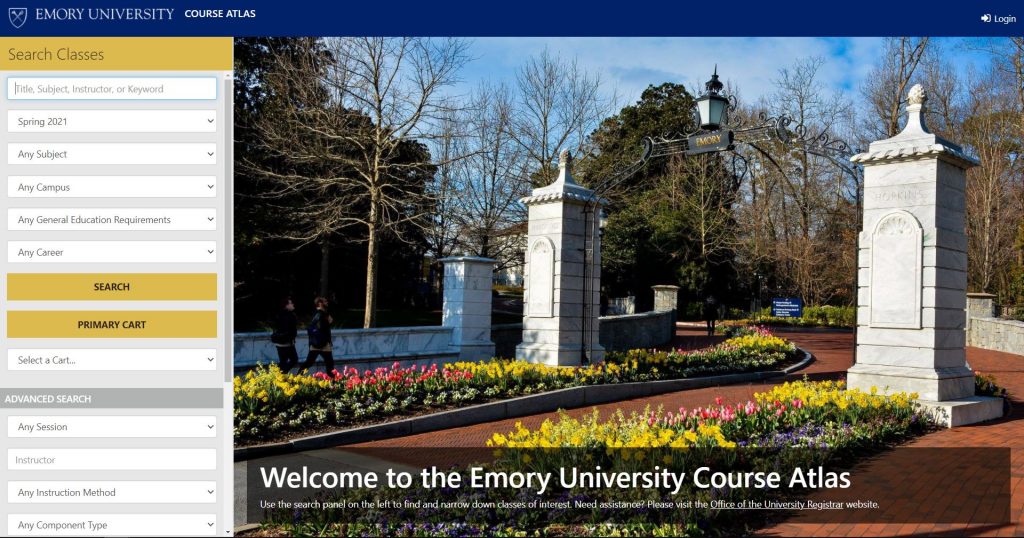
Emory University course atlas.
The fall 2021 course registration was a disaster for sophomores. Poor turnaround time and lack of knowledge among students on the registration process led to chaos and confusion. Since juniors and seniors were allowed to enroll in classes first, many sophomores found themselves pushed out of required classes for their major and some barely registered enough credits to be full-time students. Fall 2021 registration revealed holes in the system, and Emory University should consider turning to an interest period option instead.
Emory’s decision to offer 70% of classes in person and reduce class size has made it practically impossible for sophomores to satisfy major requirements. Jules Pugh (24C), who faced challenges in the course registration process, said, “The fact that I’m going into my sophomore year with two out of the 60 something credits I need for my major is ridiculous.” While Emory adjusted to the pandemic by reducing class sizes, they didn’t adjust the registration process. Pugh’s sentiment was shared by Daniel Ren (24C), who found himself once again unable to fulfill his foreign language requirement. “It’s ridiculous that sophomores cannot reserve seats in certain classes, especially in ones that we need to graduate,” Ren said. Freshmen and sophomores struggle to get into spots taken by upperclassmen, who had their spots robbed when they were underclassmen. Emory’s course registration has created a traffic jam in which underclassmen are forced to wait until junior and senior year to fulfill key requirements such as foreign language.
Though COVID-19 has worsened course registration problems, the issue extends beyond the pandemic. Juniors and seniors noted that they went through the same struggles. Lonnie Reid (23C) mentioned that while he initially thought that the problems of registration this fall would be resolved after class sizes were returned to normal, he still struggled getting into his PE general education requirement. The pandemic may have exacerbated the issue, but the inherent problem still exists. Even in a non-pandemic year, underclassmen struggle to get into the courses they need to graduate.
Instead, Emory should implement an interest period to rectify these glaring flaws. Other schools, such as Harvard University (Mass.), have a shopping period for the first two weeks of class. During this period, students can freely wander into classes, receive syllabi and meet professors before deciding what classes they’ll take. Likewise, an interest period would allow students to demonstrate to Emory which classes they want to take, potentially leading to more sections of classes being opened to accommodate for high demand. This solution differs and improves on Emory’s add-drop-swap period in that it would occur prior to registration, allowing Emory to monitor interest levels in certain classes. Classes such as NBB 201: Foundations of Behavior, which had a giant waitlist, would see more sections open and give students the chance to explore potential future majors. Instead of having to scramble to get into classes, students could utilize an interest period, Harvard’s shopping period, or a combination of both.
Many sophomores are waiting until spring registration to see if the issues will be fixed. While class sizes returning to normal may fix part of the problem, it doesn’t fix how Emory students are failing to complete certain requirements because juniors and seniors are taking up spots in required classes. Emory needs a major overhaul of its registration process, and it can’t wait any longer.
Sarah Broder (24C) is from Stamford, Connecticut.
Sarah Broder (24C) is from Stamford, Connecticut. Her hobbies include travel, film, and exploring Atlanta one restaurant at a time.




